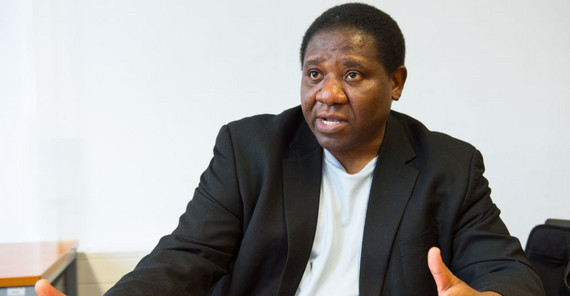Emmanuel Nuesiri’s work often takes him to the forest but he is not a forester, biologist, or lumberjack. Nuesiri is a political scientist who researches climate and environmental policy: the discrepancy between legislative politics and its implementation in those places it is meant to have an impact, to be more exact. Nuesiri, a BRAIN Research Fellow and guest of Prof. Dr. Harald Fuhr, is specifically examining forest governance in African states. Decentralizing environmental policy is meant to integrate the needs of those living in endangered natural habitats into the drafting of policy. This is the only way to effectively protect them.
“I am interested in the impact policy has on people’s lives and if or how people can influence the policy that directly affects them,” Nuesiri says. Since the 1990s many African states have – at least officially – started decentralizing their environmental policy because international donors have made this a precondition for their engagement in environmental projects. Nuesiri is investigating whether the changes in legislation also have local roots. Nuesiri’s own roots lie in the African continent, in Cameroon. His research on environmental policy, at both the global and local levels, has evolved over a long time. After studying environmental science and geology at the University of Buea, he became a trainee at a co-funded German-British forest conservation project at Mt. Cameroon – he still researches this region. “Political research requires perseverance,” Nuesiri says, “because it looks into processes that never stop.”
His search for a master’s program combining his interest in environmental and political issues brought him to Cambridge. This was an exciting step for him because he was able to attend courses of scientists he had known only from articles or books. The step back into “field research” was never far. After finishing his Master’s thesis he worked for “Fauna & Flora International”, a non-governmental organization involved in international conservation projects, as a consultant for projects in Cameroon and Nigeria. Nuesiri, however, had already realized during his master’s studies that his heart beats for science. “I had been dealing with Shell’s engagement in Gabon for a research paper,” he remembers. “Shell was taking part in a biodiversity project to improve its tarnished image. I visited Shell’s London office, talked to the vice president and the team … but when I wanted to look around on-site, suddenly nobody wanted to help me anymore. That is when I thought: ‘This is my field; here I can make a difference!’”
Thanks to a scholarship he was able to write his doctoral theses at Oxford – about Cameroon’s forest conservation policy. He worked in the field for more than two years, talked to political stakeholders, NGOs, consultants, and local people. He finds the environmental policy in African states only mediocre. “I do not want to be pessimistic but the best I can say is that the governments still have a problem entering into a dialogue with local groups, considering their needs, and listening to them.” This situation, however, is the driving force for his work. “My research can give a voice to those who cannot speak up for themselves.”
In 2010, after completing his PhD, Nuesiri followed his wife, who he had met during his studies in Cameroon, to the US. The University of Illinois offered him the opportunity to join an international research network and to examine forest governance of twelve African countries. Since November 2014 he has been continuing his research as a BRAIN Research Fellow. He is a guest at the Chair of International Politics of the Faculty of Economics and Social Sciences because Prof. Fuhr has been researching not only international climate and environmental policy but also global efforts for more effective forest conservation.
Text: Matthias Zimmermann, Translation: Susanne Voigt
Online-Editing: Agnes Bressa
Contact Us: onlineredaktionuuni-potsdampde

